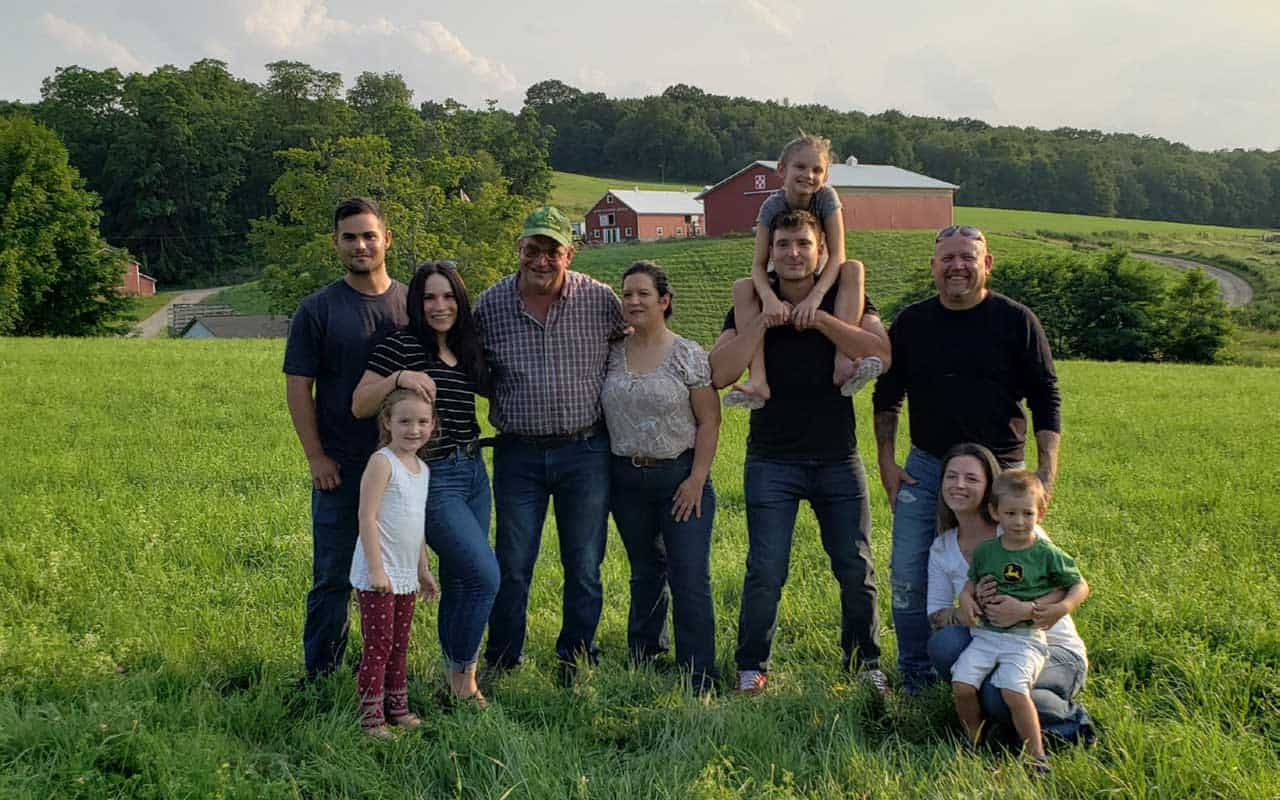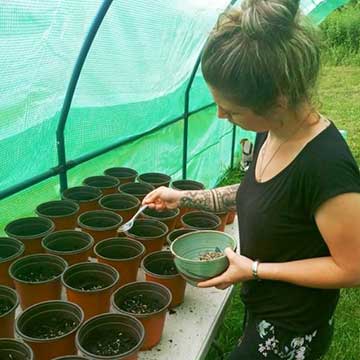This Month’s Featured Article

Reaping and Sowing For Good
 What was your family doing 100 years ago? That’s four or five generations back. Past your parents, your grandparents, your great-grandparents, and on to your great-great grandparents. Think about it. How far back do your family stories go? If you’re the average person who knows something about two or three generations back, that’s significant. Now imagine that your family has been doing what it does for 100 years – or more – and imagine if that occupation is farming the land. Clearly, century farms and the family farmers who sustain them are very special people.
What was your family doing 100 years ago? That’s four or five generations back. Past your parents, your grandparents, your great-grandparents, and on to your great-great grandparents. Think about it. How far back do your family stories go? If you’re the average person who knows something about two or three generations back, that’s significant. Now imagine that your family has been doing what it does for 100 years – or more – and imagine if that occupation is farming the land. Clearly, century farms and the family farmers who sustain them are very special people.
Emily Hay is one of them. Her family has owned and worked the Kemmerer Farm in Stanfordville, NY, since 1921, when the land was purchased by great-great grandfather Otto Kemmerer. “I’m fourth generation,” she tells me with not just pride but very real passion. “Farming is a daily thing that keeps you working together and succeeding together,” she says. “A family comes together to make it work. That’s what mine has done.”
Where it all started
Kemmerer Farm is a 100-acre hay farm. Emily is the oldest of five children in the current generation of Kemmerers. John Kemmerer, Sr., and Clara are her parents, and her siblings are John Jr. (“Hansey”), Leif, Victoria, and Kristin, who tragically passed away in late 2019. She had a passion for all animals and helping others. She would be an immense part of the foundation were she here today,” Emily says. “I know she’s smiling down on us.”
All of them were raised on and continue to work on the farm. Emily was in charge of the feed store in Pine Plains that was part of the operation until COVID came along. The store had to close, and like a lot of other people during the lockdown months of the pandemic, Emily found herself with time to think about things.
“I found myself wondering about how to make a change for farmers and their families. I started brainstorming and networking,” she says, “and I realized that I could do something for century farmers in particular – help them pay off debts, of course, but also provide business planning, help with property taxes, even provide emotional support. Anything.”
Farmers know about hardship, for sure. The weather can sabotage an entire year of a crop. Equipment breaks and needs to be repaired or replaced. Animals need attention every day of the year – morning, noon and night. Finding and keeping help can be especially challenging. It makes you appreciate what Andy Warhol once said about farming: “I think having land and not ruining it is the most beautiful art that anybody could ever want to own.”
Understanding what farmers face
“In my own life, I came to realize the extent of personal struggles that are particular to farmers, and also the struggle of family farmers not just in New York but across the country. The number of farms that can survive is diminishing year by year,” she says. Her research revealed that an ever-increasing number of small farm owners are facing bankruptcy or foreclosure, forcing them to sell property or assets to survive. In addition, due to price fixing by larger manufacturers, farmers are forced to sell their goods at lower prices even while their expenses rise. Reluctantly relying on credit to stay afloat also incurs high interest. Loss of farms isn’t just loss of livelihoods, either, though that’s significant. It’s also a loss of a way of life that is part of the foundation of this country – and the planet.
To begin to effect changes she hoped could bring relief to the farmers and farms she loves, Emily founded the Centennial Farms Foundation, a charitable organization for century farmers facing hardship. That was the first step.
It doesn’t take long in a conversation with Emily to understand that she is a force to be reckoned with. When the concept for the Centennial Farms Foundation came together, she went full speed ahead to make it happen. “I’m self-driven and self-taught,” she says, “and I got a strong sense of business from my parents working in the fields and in the feed store.” Emily verified the name and registered the Foundation with the requisite Employee Identification Number. She reached out to the Community Foundation of Orange and Sullivan, whose mission is “connecting people who care with causes that matter.” By working with them, Emily is able to get administrative support and also start taking tax-deductible contributions without having to pay the hefty price to apply for full 501©3 status for her foundation.
Making help happen
When the partnership was secured, Emily created brochures to help get the word out. She did extensive grass roots marketing, going throughout the area to talk to people where she could and distribute the brochures.
“I worked any avenue I thought could get results,” she says, “and donations started coming in immediately.”
Emily had the idea to host a fundraising event on her family farm because there had been weddings held there through the years, including her parents’ and her own. She met the super talented and well-loved jazz singer Wanda Houston through a mutual friend and told her about the Foundation. Houston and her band wanted to help, and the Centennial Hay Days Charity Music Event for the Centennial Farms Foundation was born. It’s being held at the Kemmerer Farm on Saturday, August 21, from 4 to 9pm. Not only will Houston and the band be performing, but there will also be a farm-to-table dinner and a fireworks finale. “I did all the planning for my wedding,” Emily says, “so I had an idea of what a big event would entail – though it’s definitely been more difficult and time-consuming,” she chuckles. The farm is limiting attendance to 228 guests, who must be registered as sponsors. (Information about the event can be found at www.cff100.org.)
“An event serves a couple of purposes,” Emily says. “It’s a special occasion that raises money, for sure, but it also brings the farm to life, and that’s great for everyone.”
The girl and the farm
Favorite memories Emily has of farm life include an overall free and independent feeling; swimming in the pond; being able to drive a tractor at a young age; and the satisfaction of a full day’s work. Her husband, Bradley Hay, grew up working on farms, and they have three small children – Mila who’s nine; Addisyn who’s five; and Corbin, who’s three. They have a small homestead where they live in Pine Plains, and Emily and Brad nurture a caring for animals and interconnectedness with their kids. Emily hopes to one day move back to the Kemmerer Farm. She knows it’s hard to relate to farming and all it involves when you haven’t experienced it, and that the Hudson Valley is a very desirable location for people coming from the city to visit and then settle in. While that demographic can bring new businesses and jobs and additional wealth to an area, she worries that it becomes more tempting for struggling family farms to sell, which in turn makes it that much more important that family farms get the help they need to survive.
“Farmers make the world go around,” she says. “This is a life project for me. There are at least 30 century farms in Dutchess County alone, and from there I hope to make a difference with this foundation across the country. By 2031 I hope to have raised and allocated millions of dollars for century farm owners, helping to establish economic sustainability for today’s farmers and those of the future.”
Learn more about the Centennial Farms Foundation, whose motto is “Reaping and Sowing for Good,” at www.cff100.org, and follow them on Facebook. You can also email Emily at emilyhay@cff100.org or call (845)902-8791. Register to attend the Centennial Hay Days Charity Music Event with Wanda Houston through the website. And remember to Thank a Farmer. Daily if possible.



